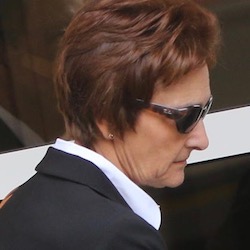 Kevyn Rakowski (Photo: Daniel Sato/The News Journal)
A 19-count superseding indictment named Robert Harra Jr., president of Wilmington Trust, David Gibson, chief financial officer, William North, chief credit officer, and Kevyn Rakowski, controller, of failing to report hundreds of millions of dollars in overdue loans to the U.S. Securities and Exchange Commission (SEC), the Federal Reserve (Fed), and investors.
North and Rakowski had been originally charged in May 2015, but the federal investigation continued and resulted in the indictment that charged all four with conspiring to defraud the United States, committing fraud in connection
with the purchase and sale of securities, and making false statements to regulators.
All four were charged with one count of making false statements in connection with the purchase or sale of securities, four counts of making false entries in banking records, seven counts of making false statements to U.S. government agencies, and two counts of making false statements in SEC reports. In addition, Harra and Gibson also were charged with two additional counts of making false statements in SEC reports. Gibson also was charged with three counts of falsely certifying financial reports.
In November 2010, WTC was purchased by another bank at a discount of nearly 50 percent from the bank’s share price the day prior to the sale.
The bank itself also was indicted. It was the first recipient of federal bailout money under the Troubled Asset Relief Program to be charged. It reached a $60 million settlement in 2017.
The trial of Harra, Gibson, North and Rakowski began on March 20, 2018 in U.S. District Court in Wilmington and lasted 31 days. The defense contended that WTC was required to file reports not only to the SEC and the Fed, but also to the Office of Thrift Supervision (OTS), an agency with the U.S. Treasury Department. Each of those regulators required that WTC report past due loans. Though none gave a definition, each described the reporting requirement in slightly different terms.
The prosecution contended that under the SEC definition, the loans should have been reported. The defense claimed that under the OTS, based on a question-and-answer section of the OTS website, the loans were not required to be reported. The defense said that the website said, “If management has restructured or extended a loan—formally or informally [—]then the loan would not be past due.”
The defense sought to present evidence of this question-and-answer section, contending that the loans in question had been extended. However, U.S. District Judge Richard Andrews refused to allow that evidence to come before the jury. The judge also declined to give a jury instruction covering the same issue.
On May 3, 2018, the jury convicted the defendants of all charges. Harra and Gibson each were sentenced to six years in prison. Rakowski was sentenced to 4½ years in prison, and North was sentenced to three years in prison. Each of the defendants was also ordered to pay a $300,000 fine. They were allowed to remain free on bond while they appealed the verdicts.
On January 12, 2021, the U.S. Court of Appeals for the Third Circuit ruled that the defense should have been allowed to present the evidence from the OTS website. The court held that the prosecution should not have been allowed to prosecute the four defendants based on the prosecution’s selection of the reporting rules.
“We hold today that to prove falsity beyond a reasonable doubt in this situation, the Government must prove either that its interpretation of the reporting requirement is the only objectively reasonable interpretation or that the [defendants’] statement was also false under the alternative, objectively reasonable interpretation,” the appeals court said. “And because the Government here produced insufficient evidence from which a rational jury could find Defendants’ statement false under this rule, we will reverse Defendants’ false statements convictions and remand on those counts for entry of judgments of acquittal.
The appeals court also vacated the remaining charges of conspiracy and securities fraud, but remanded them for a retrial.
On July 12, 2021, the prosecution dismissed the remaining charges. U.S. Attorney David Weiss said in a statement that his office decided not to retry the remaining charges. He noted that seven other bank officials had pled guilty to fraud charges.
“Prosecutors must constantly weigh a number of factors in exercising prosecutorial discretion,” Weiss said in the statement. “Those factors include not only the likelihood of obtaining a conviction, but also competing public safety priorities, and the availability of finite resources to address these priorities. In my judgment, the practical implications of the Third Circuit’s opinion and the challenges currently facing our community—such as unprecedented violent crime, the rising number of opioid overdose deaths, and domestic terrorism—counsel in favor of declining to retry [the defendants].”
“My client is relieved. 10 years of a living hell,” Harra's lawyer Michael Kelly of McCarter & English said in an email to Reuters. “He can never regain what he lost.”
– Maurice Possley
|